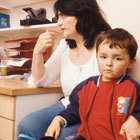Young children given hyperactivity drugs ‘against NICE guidance’

Pre-school children are being prescribed drugs such as ritalin for hyperactivity, contrary to NICE guidelines, warn child psychologists who say under-funding of child services is to blame.
Researchers found more than a fifth (22%) of educational psychologists were aware of pre-school children taking stimulant medications – despite NICE guidelines saying children under five should not be prescribed them.
The study based on a survey of 136 educational psychologists working in the UK, was carried out by researchers from the Division of Education and Child Psychology (DECP) at the British Psychological Society, and the Institute of Education at the University of London,
The staff surveyed said pressures on child and adolescent mental health services (CAMHS) meant children were not being properly assessed, and there was a rush to treat attention deficit hyperactivity disorder (ADHD) with medications rather than trying psychological interventions first, as NICE advises.
‘Our biggest difficulty is that CAMHS and paediatric teams are so short staffed they go straight to medication and completely ignore NICE guidance,’ a DECP briefing said.
The survey also found educational psychologists felt that ‘intolerance of difference’ and ‘medical models of childhood’ were influencing how children’s learning and behaviour are viewed.
Psychologists were quoted as saying: ‘There is an increasingly prevalent view in society that people who do not fit a particular environment must have something wrong with them.’
The briefing was produced in preparation for the DECP’s annual conference being held in early January, when the DECP ‘medicalisation working group’ will publish a position paper and professional practice guidelines on the diagnosis and management of ADHD.
It comes after Pulse found GPs were struggling to refer children with behavioural or emotional problems for proper assessment at CAMHS following cuts to child mental health budgets, amid plans to make even further cutbacks.
Visit Pulse Reference for details on 140 symptoms, including easily searchable symptoms and categories, offering you a free platform to check symptoms and receive potential diagnoses during consultations.









